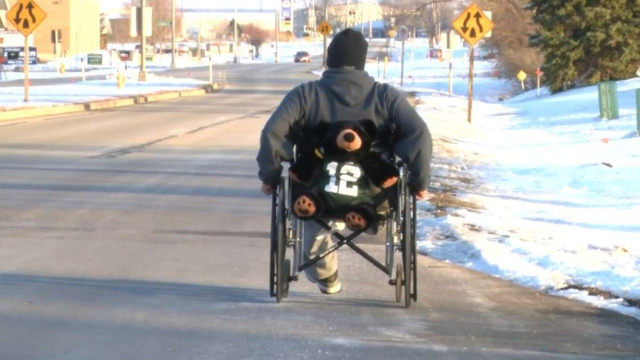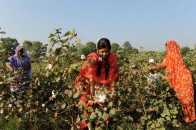Against odds: Persons with disability run for Punjab, K-P Assembly
Most candidates are contesting elections to raise awareness in society

Representational image. PHOTO: REUTERS
Raja Imran Hussain is a polio survivor who will contest the elections from Punjab Assembly's constituency of PP-14 Rawalpindi. Hussain met political leadership of all the parties but none supported him when it came to awarding the party ticket.
He had established the disability wing of Pakistan Tehreek-e-Insaf (PTI) and gathered hundreds of PWDs and polio survivors during the months long sit-in of the party in Islamabad. However he says that they were just used for political gains and nothing had been done for them.
“By supporting and working with almost all the parties, I realized that when they go to parliament they don't talk about us. We are not accepted in society and given rights enjoyed by the common people… we are entitled to special rights according to international treaties, he said, adding “So I decided to stand up and raise voice on our own.”
Integration of disabled people into society our responsibility, says Senate chairman
At present, there is no legal framework which helps people with disabilities to contest the elections. However, this shortcoming has not discouraged Hussain as he had fulfilled all the legal requirements to contest the polls like a normal candidate. He has overcome the challenges and hurdles in a bid to secure his seat and encourage other special persons to come forward.
He said that there is a representative of every segment of population in the assemblies except for special persons who are left behind due to the absence of a well-defined mechanism and laws.
"There should be three seats for PWDs in National and Provincial Assemblies each for physically disabled, blind, deaf and mute persons,” Hussain said, adding “and the fee of Rs30,000 to contest election for National Assembly seat and Rs20,000 for provincial assemblies should be reduced."
There are 16 candidates contesting for the seat in Rawalpindi but the strong contenders of major parties Hussain faces are Pakistan Muslim League-Nawaz’s (PML-N) Usama Chaudhry, PTI’s Mohammad Basharat Raja, and Pakistan Peoples Party’s (PPP) Agha Mujeeb Ahmed Khan.
The constituency mainly comprises areas of Rawalpindi and Chaklala Cantonments. Hussain has started door to door campaign to convince people that they should vote for a candidate who lives in their midst and belongs to them. He is also relying on social media campaign while many from his community are sending him messages pledging their support.
“I know my contenders come from strong families who have won this seat multiple times but my purpose was to be an example for the community that if I can stand leaving behind all the hurdles they can also take lead to be the voice of others instead of waiting for someone to speak for them," he added.
There is no accurate data available of the PWDs in Pakistan despite recent census of 2017. According to the World Report on Disability 2012, about 12 to 15 per cent of the population of an area make up PWDs. However, there are only 165,927 registered voters.
Hussain, 32, was three years old when an attack of poliovirus left his left leg weak and fragile while his right leg was also fractured and damaged later.
Hussain is the eldest of all the six siblings and holds the responsibility to financially support his family. He graduated from Allama Iqbal Open University (AIOU). Hussain runs his own nongovernmental organisation Spring for the rights of disabled persons.
He is a motivational speaker, formerly elected members for Persons with disabilities (PWDs) of government of Punjab, member of disability and transgender cell in Election Commission of Pakistan (ECP), power lifting champion, International Cricket Council (Physically Challenged) chairman and Pakistan Cricket Association Physically Handicapped (PCAPH) chairman.
There are more than 12,000 candidates contesting the general elections on 849 National and provincial seats. However, there are a few couple of PWDs contesting the elections and Yousaf Khan is one of them.
Khan, who is also a polio survivor, is contesting from PK-9 Swat III independently, finding no support from anyone. He has a hotel business and also runs a welfare organization for PWDs named Pakistan Special Persons Development Organisation.
“The objective to contest election was to raise awareness that we are also valiant citizens of this country and want to become a part of democratic process,” he said. Khan thinks the government should allocate seats for the PWDs like the women and minorities have special seats in the parliament.
He's been doing door to door campaign but it's hard for him to work like a normal person since he lives in Tehsil Matta, Swat, which is a mountainous area with muddy roads.
“The ECP should make arrangements for the PWDs in polling stations as mobility becomes more difficult for such people in hilly areas,” he said adding “In Swat some 40,000 PWDs are registered and 20,000 of them are voters. Their votes will go waste if they don't reach polling stations.”
Baitul Maal Legal Assistant Director Noreen Khan said that it is difficult for the PWDs to cast their vote unless they have family support but contesting elections is far more challenging for them. She had contested elections in 2008 from NA-48 and secured 186 votes. She suffers from cerebral palsy that has affected her left hand and leg.
She said that there are no comprehensive legislation for the PWDs since they have no representation in the parliament and no legislator took interest in addressing this issue.
“The last legislation was introduced in 1981 during General Zia's era when an ordinance about disable persons’ employment and rehabilitation was passed to enhance job quota from 1 to 2 per cent,” Noreen Khan said.
She also believes that there should be allocated seats for them with a simplified mechanism to support and ensure their participation in the electoral process and then in the parliament.
According to experts, inclusive election is an essential component of democracy which allows all fragments of population to take part in decision-making. However, the electoral and political process in Pakistan is not inclusive.
Online learning: Education opportunity for disabled out of school youth
The PWDs have no representation in the parliament and their participation in the electoral process is also limited due to lack of awareness, accessibility and barriers
Special Talent Exchange Programme Executive Director Atif Sheikh said, “PWDs have no representation in the parliament and their participation in electoral process is also limited due to lack of awareness, accessibility and barriers.” He added that those who manage to reach the polling stations are manipulated to vote in favour of the helpers.
“But with the consistent efforts of civil society and nongovernmental organisations working for PWDs, some good steps have been taken for this elections like postal balloting, making 180 polling stations accessible for them across the country, and inclusion of them as observers in elections for the first time,” Sheikh said adding “But there is a lot more needed to be done and for that their representation in the parliament is a must.”


















COMMENTS
Comments are moderated and generally will be posted if they are on-topic and not abusive.
For more information, please see our Comments FAQ